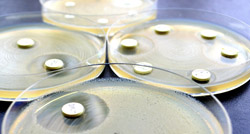Synthetic production of antibiotics
Streptomyces is a genus of bacteria capable of growing in diverse environments. Their most intriguing property is the production of biologically active secondary metabolites that can serve as anti-fungal and anticancer agents or antibiotics. Expression of these molecules endows Streptomyces bacteria with a competitive advantage, thereby improving their overall survival. As a result, Streptomyces could be exploited in biotechnology for the production of antibiotics or other biologically relevant molecules. In this context, the EU-funded 'Genome mining in Streptomyces violaceusniger, a prolific antibiotic producer' (ZHOU_PFL_POLYKETIDES) project focused on a particular family of enzymes that are implicated in the biosynthesis of antibiotics in the bacterial species Streptomyces violaceusniger DSM4137. These multi-enzyme complexes are called polyketide synthases and catalyse the production of polyketide compounds such as erythromycin and doxycycline. In this context, scientists isolated, cloned and characterised large biosynthetic gene clusters from Streptomyces violaceusniger DSM4137 for the production of various natural products. To further understand the association between biosynthetic pathways, they deleted certain genes of these clusters or altered regulatory genes, and observed the synthesis output. Also, through genetic engineering, they obtained mutants of the polyketide synthase cluster to maximise expression. These efforts led to successful production of the anti-fungal compound azalomycin, the anti-cancer agent nigericin and the antibiotic elaiophylin. Considerable work also went into the enzymology of these reactions and the molecular mechanism underlying the chemical biosynthesis of these compounds. Collectively, the activities of the study support the transfer of biosynthetic enzymes in biotechnologically relevant microorganisms to produce a specified target molecule. This approach overcomes a significant bottleneck in the synthetic biology of natural products.
Keywords
Antibiotics, synthetic biology, Streptomyces, biotechnology, genome mining

